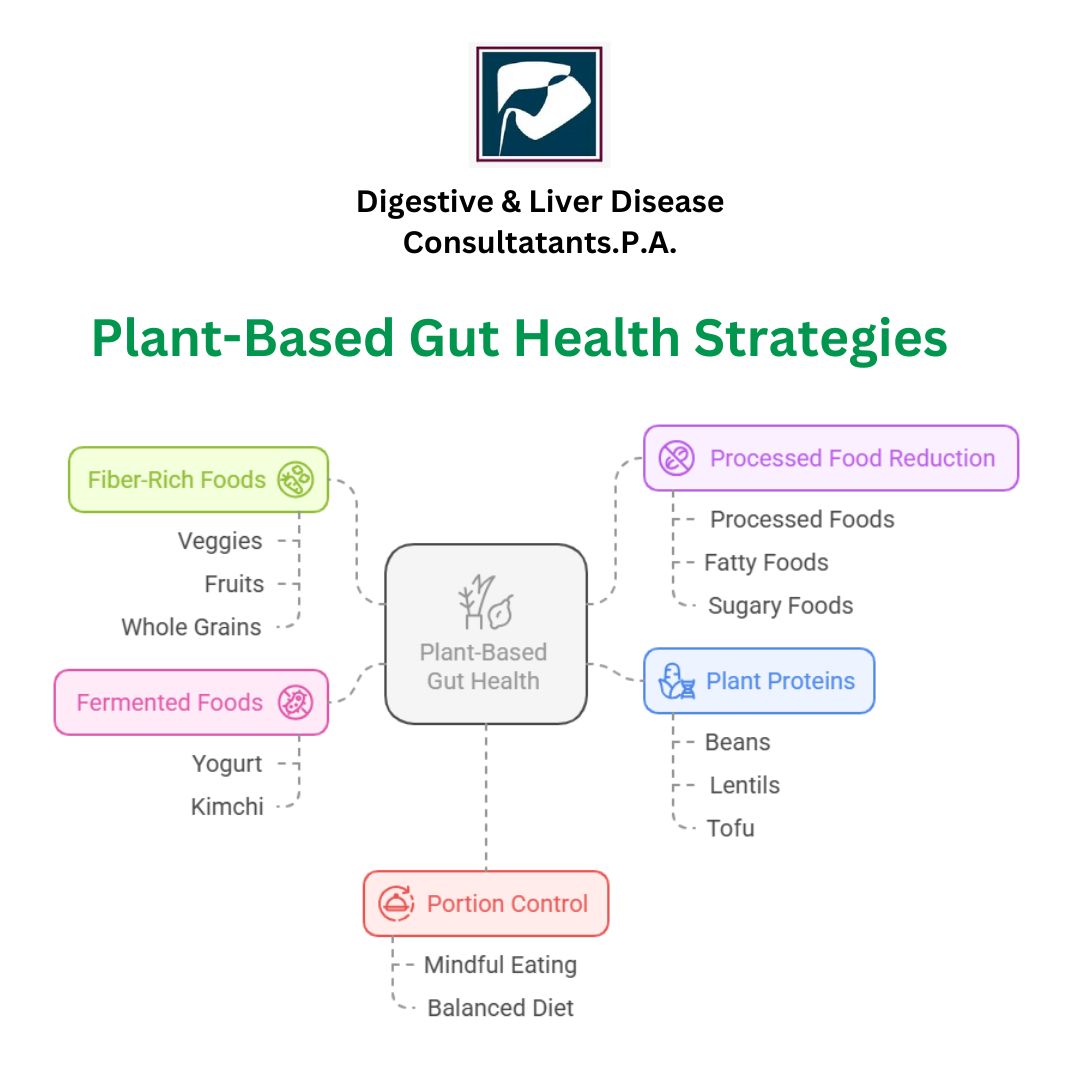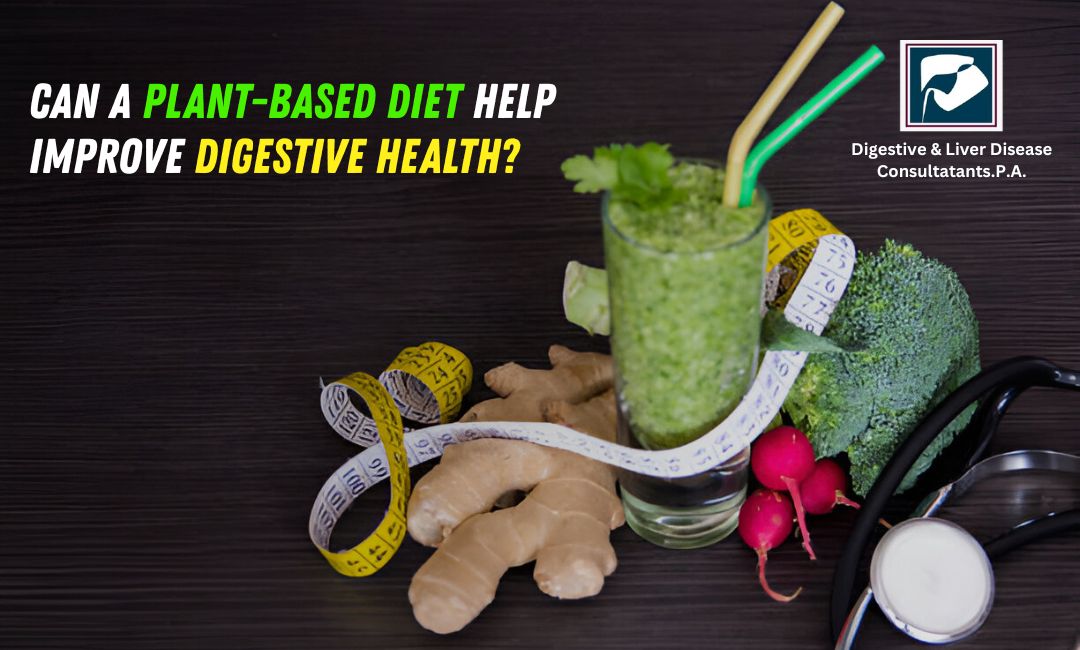Good digestion is key to feeling healthy, energetic, and comfortable every day. What you eat directly affects how your digestive system works. In recent years, many people have turned to plant-based diets not only for weight management and heart health but also to improve their digestive health. But can eating more plant-based foods really make a difference for your digestion? Let’s explore how a plant-based diet impacts your digestive system and why it might be worth considering.
At Digestive & Liver Disease Consultants, P.A., we believe that understanding how food affects your gut is an important step toward maintaining good health. In this blog, we’ll break down how a plant-based diet can support digestion and when you might want to talk to a specialist about your digestive concerns.
What Is a Plant-Based Diet?
A plant-based diet focuses on eating mostly or entirely foods that come from plants. This includes:
- Fruits
- Vegetables
- Legumes (beans, lentils, chickpeas)
- Whole grains
- Nuts and seeds
- Plant-based oils
Some people on plant-based diets avoid animal products entirely, while others include small amounts of dairy, eggs, or fish. The main idea is that the majority of your calories and nutrients come from plant sources.

How a Plant-Based Diet Supports Digestive Health
Your digestive system breaks down food, absorbs nutrients, and removes waste from the body. What you eat can either support this process or disrupt it. Here’s how a plant-based diet can help:
1. Rich in Fibre
Plant-based foods are naturally high in fibre, which is essential for good digestion. Fibre adds bulk to your stool and helps food move smoothly through your digestive tract. It can prevent constipation, reduce bloating, and lower your risk of digestive disorders like diverticulitis, irritable bowel syndrome (IBS), and hemorrhoids.
There are two types of fiber:
Soluble fiber (found in oats, beans, and apples) absorbs water and forms a gel-like substance, helping to soften stool.
Insoluble fiber (found in whole grains, carrots, and nuts) adds bulk to stool and helps it pass through the intestines.
2. Supports Healthy Gut Bacteria
Your gut is home to trillions of bacteria, known as the gut microbiome. These bacteria help digest food, produce vitamins, and protect against harmful germs. A plant-based diet provides prebiotics — the fiber that feeds your good gut bacteria. When these bacteria thrive, they improve digestion, boost your immune system, and may reduce inflammation throughout the body.
3. Reduces Digestive Inflammation
Animal-based foods high in saturated fats and processed meats can cause inflammation in the digestive tract, leading to discomfort and long-term health problems. Plant-based diets, on the other hand, are rich in anti-inflammatory compounds like antioxidants, vitamins, and minerals. These nutrients can calm inflammation in the gut and may help manage conditions like ulcerative colitis and Crohn’s disease.
4. Promotes Regular Bowel Movements
Thanks to its high fibre content, a plant-based diet naturally promotes regular, healthy bowel movements. This reduces the risk of constipation, bloating, and other uncomfortable digestive symptoms.
5. May Lower the Risk of Digestive Diseases
Research suggests that plant-based diets can lower the risk of several digestive conditions, including:
- Gastroesophageal reflux disease (GERD)
- Colorectal cancer
- Diverticular disease
- Gallstones
- Non-alcoholic fatty liver disease
By improving digestion and reducing inflammation, a plant-based diet may help protect your digestive organs over time.
Foods to Include for Better Digestive Health
If you’re considering adding more plant-based foods to your diet, here are some digestion-friendly options to start with:
Fruits: Berries, bananas, apples, pears, and oranges
Vegetables: Leafy greens, carrots, broccoli, zucchini, sweet potatoes
Legumes: Lentils, chickpeas, black beans, kidney beans
Whole grains: Brown rice, quinoa, oatmeal, whole-wheat bread
Nuts and seeds: Almonds, chia seeds, flaxseeds, walnuts
Fermented plant foods: Kimchi, sauerkraut, miso, and plant-based yogurts with probiotics
Don’t forget to drink plenty of water, as fibre works best when paired with adequate hydration.
Things to Watch Out For
While a plant-based diet offers many benefits, it’s important to transition thoughtfully:
Introduce fibre slowly: If you increase your fibre intake too quickly, it can lead to gas, bloating, and discomfort. Gradually adding high-fiber foods to your meals can help your body adjust.
Watch for nutrient deficiencies: If you exclude all animal products, make sure to get enough Vitamin B12, iron, calcium, and omega-3 fatty acids through fortified foods or supplements.
Identify food sensitivities: Some plant-based foods, like beans and cruciferous vegetables (broccoli, cabbage), can cause gas in some people. Pay attention to how your body responds and adjust as needed.
When to See a Digestive Specialist
Even with a healthy, plant-based diet, some people may still experience digestive issues like:
- Chronic bloating or gas
- Persistent constipation or diarrhea
- Acid reflux or heartburn
- Abdominal pain
- Unexplained weight loss
- Blood in stool
If you notice these symptoms, it’s important to consult a gastroenterologist for a proper evaluation.
About Digestive & Liver Disease Consultants, P.A.
At Digestive & Liver Disease Consultants, P.A., we specialise in diagnosing and treating a wide range of digestive and liver-related conditions. Our expert team of board-certified gastroenterologists uses advanced diagnostic tools and personalised treatment plans to help you achieve optimal digestive health. Whether you need routine screenings, treatment for chronic digestive conditions, or nutritional guidance, we’re here to support your health journey.
Conclusion
A plant-based diet offers many benefits for your digestive health, from improving bowel regularity to supporting a healthy gut microbiome and reducing inflammation. By focusing on whole, fibre-rich plant foods and paying attention to your body’s needs, you can enjoy better digestion and overall wellness.
If you’ve been struggling with digestive problems or have questions about how your diet may be affecting your gut health, contact Digestive & Liver Disease Consultants, P.A. today. Our experienced team is ready to help you find relief and get your digestive health back on track.






